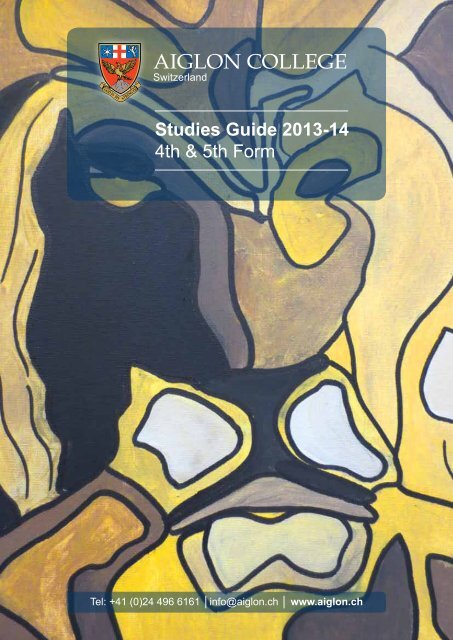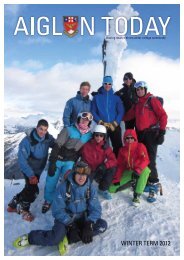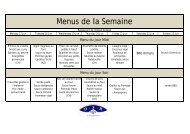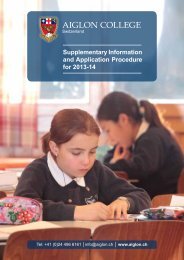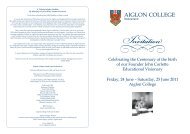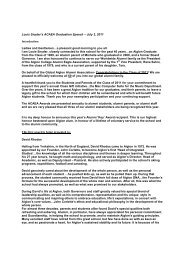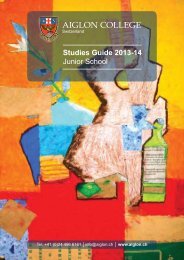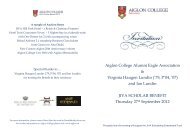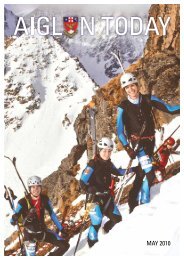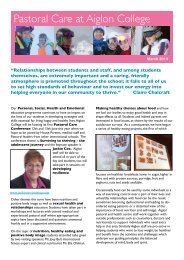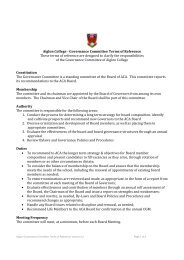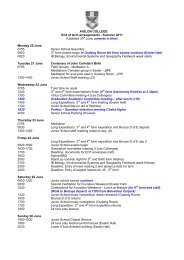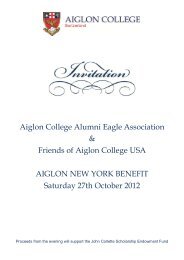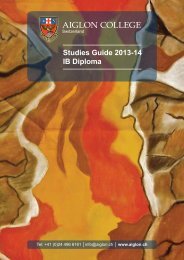4th and 5th Form Studies Guide - Aiglon College
4th and 5th Form Studies Guide - Aiglon College
4th and 5th Form Studies Guide - Aiglon College
You also want an ePaper? Increase the reach of your titles
YUMPU automatically turns print PDFs into web optimized ePapers that Google loves.
AIGLON COLLEGESwitzerl<strong>and</strong><strong>Studies</strong> <strong>Guide</strong> 2013-14<strong>4th</strong> & <strong>5th</strong> <strong>Form</strong>Tel: +41 (0)24 496 6161 │info@aiglon.ch │ www.aiglon.ch
AIGLON COLLEGE<strong>4th</strong> <strong>and</strong> <strong>5th</strong> <strong>Form</strong><strong>Studies</strong> <strong>Guide</strong>INDEXTHIS GUIDE .................................................................................................................................................. 2THE STRUCTURE OF THE AIGLON CURRICULUM ........................................................................................... 2GCSE <strong>and</strong> IGCSE at Key Stage 4 ................................................................................................................ 2Compulsory Subjects in the <strong>4th</strong> <strong>and</strong> <strong>5th</strong> <strong>Form</strong>s ........................................................................................... 3Optional Subjects to IGCSE ........................................................................................................................ 3Choosing the Optional Subjects .................................................................................................................. 4Learning Support in the crucial years to IGCSE ........................................................................................... 4<strong>College</strong> <strong>and</strong> Careers Counselling ................................................................................................................ 4COMPULSORY SUBJECTS ............................................................................................................................... 5English ...................................................................................................................................................... 5Mathematics .............................................................................................................................................. 6French……………………………………………………………………………………………………………………………………………….7Physical Education ................................................................................................................................... 8Religious <strong>Studies</strong> ..................................................................................................................................... 10SCIENCE CHOICES ...................................................................................................................................... 11Choosing Directions in Science ................................................................................................................. 11Biology .................................................................................................................................................... 11Chemistry ................................................................................................................................................ 12Physics .................................................................................................................................................... 12SOCIAL SCIENCE CHOICES .......................................................................................................................... 13Business <strong>Studies</strong> ...................................................................................................................................... 13Geography ............................................................................................................................................... 14History .................................................................................................................................................... 15ARTS CHOICES ........................................................................................................................................... 16Art .......................................................................................................................................................... 16Drama ................................................................................................................................................ 17-18Music ................................................................................................................................................. 19-20LANGUAGES CHOICES ................................................................................................................................. 21German ................................................................................................................................................... 21Spanish ................................................................................................................................................... 22ADDITIONAL INFORMATION ....................................................................................................................... 23Expeditions.............................................................................................................................................. 23Private Language Tuition ......................................................................................................................... 24<strong>Aiglon</strong> <strong>4th</strong> <strong>and</strong> <strong>5th</strong> <strong>Form</strong> <strong>Studies</strong> <strong>Guide</strong> 2013-14 1
THIS GUIDEWelcome to the <strong>4th</strong> <strong>and</strong> <strong>5th</strong> <strong>Form</strong> <strong>Studies</strong> <strong>Guide</strong> for 2012-13. This <strong>Guide</strong> is intended to outline the shape ofthe Curriculum <strong>and</strong> to help students <strong>and</strong> their parents in making informed choices about the subjects they willstudy.Core subjects are listed first in this guide, followed by the Social Sciences (Geography <strong>and</strong> History), then theArts subjects (Art, Drama <strong>and</strong> Music), Modern Foreign Languages (German <strong>and</strong> Spanish), finally PE.In each case, the Examination Board <strong>and</strong> Specification (syllabus) numbers are given for reference. Thedepartment email address is also shown so that students may contact the department if further questions arise.Information is also given on our website at www.aiglon.ch/studies <strong>and</strong> on each Department’s page aslisted in this guide.Mrs Nicola SparrowDeputy Head Curriculumstudies@aiglon.ch orcurriculum@aiglon.chTHE STRUCTURE OF THE AIGLON CURRICULUM<strong>Aiglon</strong>’s guiding principles have helped us to structure an academic curriculum in Key Stage 4 - the <strong>4th</strong> <strong>and</strong> <strong>5th</strong><strong>Form</strong>s - that is rigorous, supportive <strong>and</strong> appropriately challenging. The programme of study at Key Stage 4builds on the knowledge; underst<strong>and</strong>ing <strong>and</strong> skills acquired in the previous years <strong>and</strong> sets a foundation forsuccess in 6th <strong>Form</strong> International Baccalaureate Diploma courses. However, Key Stage 4 can also be seen as aseparate programme of study, allowing access to the curriculum for those new to the college. The followingdiagram illustrates how the curriculum at Key Stage 4 fits in with previous <strong>and</strong> future learning at <strong>Aiglon</strong>.Junior School Middle School Upper SchoolUKNC KS2 UKNC KS3 UKNC KS3 UKNC KS4 UKNC KS5Years 5 <strong>and</strong> 6 Years 7 <strong>and</strong> 8 Year 9 Years 10 <strong>and</strong> 11 Years 12 <strong>and</strong> 13Prep <strong>Form</strong> 1 <strong>Form</strong> 1A <strong>Form</strong> 3A <strong>Form</strong> 4 IGCSE L6th <strong>Form</strong>Prep <strong>Form</strong> 2 <strong>Form</strong> 1B <strong>Form</strong> 3B <strong>Form</strong> 5 IGCSE U6th <strong>Form</strong> IB Diploma<strong>Form</strong> 2A <strong>Form</strong> 3C<strong>Form</strong> 2B <strong>Form</strong> 3ESLJunior ESLN.B. “UKNC” means the UK National Curriculum, “KS” means Key Stage.GCSE <strong>and</strong> IGCSE at Key Stage 4The Key Stage 4 curriculum is made up of a number of compulsory (core) <strong>and</strong> optional IGCSE courses. Coursesstart in the <strong>4th</strong> <strong>Form</strong> (UK National Curriculum Year 10) <strong>and</strong> are assessed at the end of the <strong>5th</strong> <strong>Form</strong> (NC Year11) via GCSE or IGCSE examinations. The results are certificated by one of the accredited UK or UK-basedinternational examination groups, such as Cambridge International Examinations, Edexcel, AQA or OCR.The main difference between a GCSE (General Certificate of Secondary Education) <strong>and</strong> an IGCSE(“International” GCSE) is the coursework component, with IGCSE courses tending to be less dependent on acoursework element <strong>and</strong> more dependent on the final examination. Heads of Departments offer courses thatare most suited to our students’ needs <strong>and</strong> so students take a combination of GCSE <strong>and</strong> IGCSE courses, all ofequal value.<strong>Aiglon</strong> <strong>4th</strong> <strong>and</strong> <strong>5th</strong> <strong>Form</strong> <strong>Studies</strong> <strong>Guide</strong> 2013-14 2
IGCSEs are graded from A* to G, <strong>and</strong> U (“unclassified”). For entrance to a UK university, only grades A* to Care regarded as passes <strong>and</strong> are thus important matriculation requirements for entry to 6th <strong>Form</strong> study at <strong>Aiglon</strong><strong>and</strong> elsewhere. It is possible, in a small number of subjects, for students to take their final IGCSE examinationsone year early, at the end of our <strong>4th</strong> <strong>Form</strong>.IGCSE assessment in some subjects is according to tiers or levels of entry. Heads of Departments will decide onthe appropriate tier of entry for each student during preparations for the examinations, based on the student’sattainment <strong>and</strong> progress so far. The level or tier entered determines the range of grades which are available tothe student. The Higher tier (or Extended level) paper(s) must be taken for access to the top grades. Thefollowing table gives an indication of which grades are available at each tier or level:IGCSEGCSELevel Grades available Tier Grades availableCore C to G Foundation D to GExtended A* to G Intermediate B to EHigherA* to CCompulsory Subjects in the <strong>4th</strong> <strong>and</strong> <strong>5th</strong> <strong>Form</strong>sIn the <strong>4th</strong> <strong>and</strong> <strong>5th</strong> <strong>Form</strong>s every student is required to take the following subjects:• English (4 periods per week)• Mathematics (4 periods per week)• Science (6 periods per week) - dual or triple award• Religious <strong>Studies</strong> (1 period per week in the 4 th form only)• Physical Education (4 periods per week in the Autumn <strong>and</strong> Summer terms, 6 periods in the Winter toaccommodate the skiing programme - also GCSE Short Course PE is available as an option)Optional Subjects to IGCSEStudents choose three additional subjects (3 periods a week each), one from each option block, as follows:• One of the three Arts: Art, Drama or Music.• One of the Social Sciences: Geography, History.Students now have a fairly free choice to take a subject from:• History• Geography• Music• Art• Drama• Spanish (for beginners)• German (for beginners)Please note that timetabling considerations may prevent certain combinations of subjects,<strong>and</strong> we reserve the right not to run courses for which there is insufficient dem<strong>and</strong>.<strong>Aiglon</strong> <strong>4th</strong> <strong>and</strong> <strong>5th</strong> <strong>Form</strong> <strong>Studies</strong> <strong>Guide</strong> 2013-14 3
Choosing the Optional SubjectsStudents are introduced to the process of making informed <strong>and</strong> appropriate choices for GCSE choices in theWinter term of the 3rd <strong>Form</strong>. Students are expected to choose a balance of subjects for the following twoyears up to IGCSE level <strong>and</strong> decisions are made with appropriate guidance from their parents, teachers, tutors<strong>and</strong> the Heads of 3rd <strong>and</strong> <strong>4th</strong> <strong>Form</strong>s. Students receive extensive guidance on options for IGCSE, given thatthis is often the first time they have had to choose subjects in their curriculum. Indeed, it can be seen as animportant part of any child’s education, as life outside school in later years will require informed <strong>and</strong>considered decision-making.A series of introductions to the optional subjects takes place in the Winter term at <strong>Aiglon</strong>, during which studentssee presentations by Heads of Departments. These presentations are particularly important if a student isconsidering talking a subject not taken before, since there are new subjects introduced in the <strong>4th</strong> <strong>Form</strong> whichdo not appear in the 3rd <strong>Form</strong>.It is sensible to use the following criteria for choices:• choose subjects in which the student has ability;• choose subjects which the student enjoys <strong>and</strong> finds interesting;• choose subjects that may be desirable or essential when making choices for the IB <strong>and</strong> university.Every effort will be made to accommodate students' wishes when making these choices. However, in the eventof a subject becoming over-or under-subscribed, it may become necessary for an individual to be invited tochoose an alternative subject. Heads of Departments <strong>and</strong> teachers may also raise the issue of suitability <strong>and</strong>we will discuss this with students <strong>and</strong> endeavour to contact parents in the event of unresolved difficulties.Learning Support in the crucial years to IGCSEAll students who are in the <strong>4th</strong> <strong>and</strong> <strong>5th</strong> <strong>Form</strong>s are fully integrated into the normal school programme. For thosewho need a lighter programme to include extra Learning Support, it is possible to take only 5 elective subjectsat IGCSE plus the normal Compulsory subjects, to cater for their needs.Some students who need a minimal amount of learning support can complete a full academic programmewith all 6 elective subjects. Their need for extra time is catered for in the internal <strong>and</strong> external exams asnecessary.It may be necessary that after all the school internal mechanisms have been gone through, that a full educationalpsychological assessment may be required to further identify any possible specific learning difficulty (SPLD).Should this be the case, parents will be contacted in order to seek permission. The assessment report will beundertaken by a qualified educational psychologist <strong>and</strong> the results/ recommendations will be placed on the internallearning support register to guide the everyday needs of the individuals. If further intervention is required, parentswill be consulted regarding this provision. As a result of the educational assessment it may be possible to apply forspecial “Access Arrangements” which would be appropriate for external examinations.We always aim to meet the needs of students in our care through regular monitoring <strong>and</strong> careful consultationbetween the Learning Support Department, teachers <strong>and</strong> Houseparents. However, if, in the opinion of the HeadMaster, the school cannot provide adequately for a student's needs (academic or pastoral) a transfer to analternative (perhaps more specialised) school may be required. In such cases, <strong>Aiglon</strong> will do all it can to identify asuitable alternative school <strong>and</strong> assist with the transfer process.<strong>College</strong> <strong>and</strong> Careers CounsellingAll students in the <strong>5th</strong> <strong>Form</strong> attend a weekly study skills class throughout the year focusing on topics relatedto university choices <strong>and</strong> career paths. General information is presented for admission <strong>and</strong> applicationprocedures at various university options in the United States <strong>and</strong> Canada, the United Kingdom, Switzerl<strong>and</strong><strong>and</strong> other locations throughout Europe <strong>and</strong> the world. In addition, all students take a PSAT exam as practicefor the SAT, a commonly requested US admission test, <strong>and</strong> several questionnaires are completed forpersonality <strong>and</strong> career assessment. Finally, options for summer enrichment activities or programs arediscussed <strong>and</strong> encouraged. This course helps to prepare students for their 6th <strong>Form</strong> IB course selections <strong>and</strong>university choices. Parents <strong>and</strong> students may request a meeting with the Director of <strong>College</strong> <strong>and</strong> CareerCounselling at any time during the year.<strong>Aiglon</strong> <strong>4th</strong> <strong>and</strong> <strong>5th</strong> <strong>Form</strong> <strong>Studies</strong> <strong>Guide</strong> 2013-14 4
COMPULSORY SUBJECTSEnglish(english@aiglon.ch) www.aiglon.ch/englishIGCSE <strong>and</strong> O-level Specifications: Cambridge International Examinations, as below:Why English?As English is the working language of the school, it is a key subject even if students areplanning to specialise in other areas.How is English taught in these forms?Students are allocated to sets according to their ability. Those in higher sets will take both the O Level EnglishLanguage <strong>and</strong> IGCSE Literature exams, as will set three if their Literature skills are strong enough. Students willbe placed in a pure language set if their language skills need special attention. There is also a set for English asa Second Language for students whose level of English is at Intermediate ESL level. Traditionally, students whotake this qualification in <strong>4th</strong> form then take the O-level in the <strong>5th</strong> <strong>Form</strong>.SpecificationsCambridge IGCSE English Literature (0486)Students will study three texts from each of the three genres (Prose, Poetry <strong>and</strong> Drama) <strong>and</strong> will be requiredto answer a question on each of them in the examination. Typical of the texts studied are: The Great Gatsbyby F. Scott Fitzgerald; The Tempest by William Shakespeare; <strong>and</strong> a collection of poetry from different ages <strong>and</strong>across cultures, called Songs of Ourselves.Cambridge O-level in English Language (1123)Almost all fifth form students will sit this exam. The skills involved provide an excellent backbone to theirstudies in other subjects. In preparation for the exam, students are taught to write creative, narrative <strong>and</strong>discursive essays <strong>and</strong> to write for a variety of audiences. In addition, they learn comprehension <strong>and</strong>summary writing skills.Cambridge First Certificate in English (FCE)This Specification is normally followed by the Second Language set in the <strong>4th</strong> <strong>Form</strong>. It is the best-known of allESL Specifications <strong>and</strong> the examination tests, at Intermediate level, English grammar, Composition, ReadingComprehension, Listening <strong>and</strong> Speaking.International English Language Testing System (IELTS)<strong>5th</strong> <strong>Form</strong> non-native English speakers are also prepared for <strong>and</strong> sit the General Training Module of thisinternationally recognised qualification. This is a good indicator of the level of English <strong>and</strong> serves as a guide to IBchoices.<strong>Aiglon</strong> <strong>4th</strong> <strong>and</strong> <strong>5th</strong> <strong>Form</strong> <strong>Studies</strong> <strong>Guide</strong> 2013-14 5
Mathematics(maths@aiglon.ch) www.aiglon.ch/mathsGCSE Specification: Edexcel IMA0AO Maths: OCR 6993Why Mathematics?Mathematics at GCSE level forms the foundation for all successful further study in the IB. It builds on work learntin earlier years, providing the mathematical skills needed in further education, employment <strong>and</strong> everydaylife. It also provides the mathematical skills required in many other subjects. A qualification in mathematics atthis level is an essential prerequisite for most full-time Higher Education courses. There are also many areas ofemployment that see GCSE in mathematics as an important, if not essential, qualification. This course aims toenable students to:• develop their mathematical knowledge <strong>and</strong> skills in a way which encourages confidence <strong>and</strong> providessatisfaction <strong>and</strong> enjoyment;• develop a feel for number, carry out calculations <strong>and</strong> underst<strong>and</strong> the significance of the answer;• apply mathematics to everyday situations <strong>and</strong> solve problems;• develop an underst<strong>and</strong>ing of mathematical principles;• use mathematics as a means of communication with emphasis on the use of clear expression;• develop an ability to apply mathematics in other subjects, particularly science <strong>and</strong> technology;• develop the abilities to reason logically, to classify, to generalise <strong>and</strong> prove;• appreciate pattern <strong>and</strong> relationships in mathematics;• produce <strong>and</strong> appreciate imaginative <strong>and</strong> creative work arising from mathematical ideas;• develop their mathematical abilities by considering problems <strong>and</strong> conducting individual <strong>and</strong> cooperativeenquiry <strong>and</strong> experiment, including work of a practical <strong>and</strong> investigative kind;• acquire a foundation appropriate to their further study of mathematics <strong>and</strong> other disciplines.How is Mathematics taught at <strong>Aiglon</strong>?All students are allocated to sets according to their ability. Higher sets are prepared for the Higher tier papers<strong>and</strong> lower sets for the Foundation tier papers. Students hoping to continue on to SL <strong>and</strong> HL IB mathematics willnormally be in sets 1, 2 or 3. The decision about which tier to prepare a student for is not always an easy one.Stronger students take the SL <strong>and</strong> HL IB courses <strong>and</strong> weaker ones generally take Maths <strong>Studies</strong>. Themathematics department has years of experience of making the decision between tiers of entry, <strong>and</strong> we havedeveloped effective methods for assessing a student's potential. For students who join the school at thebeginning of the <strong>4th</strong> <strong>Form</strong>, this may take us some time. For students who have been at the school in the 3rd<strong>Form</strong>, we normally have them at the correct level at the beginning of the <strong>4th</strong> <strong>Form</strong>. We take into account all ofthe following:• Students, parents <strong>and</strong> teachers want the students to achieve a good qualification in mathematics.• There is no difference in certification between a C gained at Higher tier or Foundation tier.• The philosophy behind GCSE mathematics is that we should be allowing students to succeed: thismeans they should ideally be working at a level where they are averaging 65%.• It is important that students are entered for the correct tier. A student who is having success atFoundation tier is more likely to gain a C at this level than at Higher tier.• The decision should be made as early as possible in the <strong>4th</strong> <strong>Form</strong>, to ensure that students areworking at an appropriate level <strong>and</strong> have the best chance of success.• In all of this we have the best interest of the students at heart: we want them to succeed.SpecificationWe follow the Edexcel GCSE specification at either Higher or Foundation tier. These are assessed by:• Two written papers, one with a calculator <strong>and</strong> one without, comprising 50% each, taken at the end of the<strong>5th</strong> <strong>Form</strong>• For students in the top set who may go on to study IB level we also cover the OCR Additional Mathematiccourse in order to help students prepare for the rigour of IB level mathematics.TextCurrently we use David Raynor’s Revision <strong>and</strong> Practice text book that is published by Oxford University Press.<strong>Aiglon</strong> <strong>4th</strong> <strong>and</strong> <strong>5th</strong> <strong>Form</strong> <strong>Studies</strong> <strong>Guide</strong> 2013-14 6
French(french@aiglon.ch)Why French?We live in a French-speaking area, <strong>and</strong> it is therefore the major foreign language taught at <strong>Aiglon</strong>.How is French taught at <strong>Aiglon</strong>?Since students enter the school with very different levels of French, from beginner to native language, we try tobe as flexible as possible in setting the groups. The <strong>4th</strong> <strong>Form</strong> is split into four groups. The lowest group is forbeginners, there are three intermediate levels, <strong>and</strong> the top group is for native <strong>and</strong> near-native French speakers,who study both literature <strong>and</strong> language. The latter group takes the IGCSE examination at the end of 3 rd <strong>Form</strong> <strong>and</strong>DELF B2 at the end of the <strong>5th</strong> <strong>Form</strong>.The <strong>5th</strong> <strong>Form</strong> is split into five sets: set 5 is for complete beginners in French, sets 2, 3 <strong>and</strong> 4 are intermediatesets, while set 1 is for native speakers. Students in this top set are entered for DELF B2. As far as possible, allclasses are conducted in the target language.Who takes French?French is not optional at this level. It is taken by students of varying backgrounds due to its importance <strong>and</strong> thefact that many students at <strong>Aiglon</strong> are native speakers or bilingual.SpecificationThe GCSE Specification gives equal importance to all four communication skills: listening, speaking, reading <strong>and</strong>writing. The emphasis in the earlier stages is on listening <strong>and</strong> speaking, with the other skills becoming increasinglyimportant. At Foundation level, the students’ work is judged mainly in communication, with oral <strong>and</strong> writtenaccuracy becoming more important at higher level.IGCSE French involves more detailed language work <strong>and</strong> the study of literature <strong>and</strong> topics that prepare studentsfor the IB diploma. DELF B2 is a proficiency test offered by the French Alliance <strong>and</strong> is recognised worldwide. It willlater be useful for students who passed it as they can opt out of a French/Swiss university’s language entranceexam.<strong>Aiglon</strong> <strong>4th</strong> <strong>and</strong> <strong>5th</strong> <strong>Form</strong> <strong>Studies</strong> <strong>Guide</strong> 2013-14 7
Physical Education (<strong>4th</strong> <strong>Form</strong>)(pe@aiglon.ch)The aims of Physical Education in the 4 th <strong>Form</strong> are threefold:(i) To develop physical skills, fitness <strong>and</strong> sportsmanship(ii) To generate a healthy <strong>and</strong> active lifestyle(iii) To further students’ appreciation of the value of sport <strong>and</strong> recreation as an integral aspect ofcultureTo achieve the aims of Physical Education, students follow a diverse programme of study, offering a breadth ofexperience in the following areas of activity:Invasion Games: Association Football, Basketball, Mini-RugbyNet-Wall Games: Tennis, BadmintonStriking-Fielding Games: Softball, Rounders, Indoor CricketAthletic Activities: Track <strong>and</strong> Field, Cross-country RunningAquatic Activities: Swimming Strokes, Personal Survival, Water PoloOutdoor Adventure Activities: Alpine <strong>and</strong> Cross-country SkiingHealth-Related ExerciseClasses are taught by fully trained <strong>and</strong> qualified Physical Education specialists. Teaching incorporates arange of styles to induce greater student independence both as learners <strong>and</strong> as active participants in physicalactivity. All classes are practical based, although the Health Related Exercise course does involve an element ofclassroom-based theory. In the Winter term, students are taught for at least two hours per week by qualified skiinstructors <strong>and</strong> there is an introduction to cross-country skiing.Assessment is ongoing <strong>and</strong> students are encouraged to analyse their own progress <strong>and</strong> performancein an informal context. An effort grade is awarded termly <strong>and</strong> students also receive a written report on theirprogress <strong>and</strong> efforts at the end of each term.Many students are involved in the wide range of extra curricular activities that take place after school <strong>and</strong>during weekends. Teams compete with local international schools, catering for boys <strong>and</strong> girls in football,basketball, cross-country running, swimming, skiing, tennis <strong>and</strong> track <strong>and</strong> field. Dance, yoga <strong>and</strong> fitness trainingcan also be pursued as leisure-time interests. Free Skiing <strong>and</strong> Snowboarding on Wednesday <strong>and</strong> Saturdayafternoons allows students the freedom to enjoy the slopes with their friends whilst a number of students opt forthe collective snowboarding class. Private tennis lessons are also available by arrangement.<strong>Aiglon</strong> <strong>4th</strong> <strong>and</strong> <strong>5th</strong> <strong>Form</strong> <strong>Studies</strong> <strong>Guide</strong> 2013-14 8
Physical Education (<strong>5th</strong> <strong>Form</strong>)(pe@aiglon.ch)Why Physical Education?Physical Education offers students the opportunity to explore <strong>and</strong> appreciate physical skills, strategies <strong>and</strong>tactics within the context of sport, dance <strong>and</strong> recreational activity. It seeks to embrace human movement as apleasurable <strong>and</strong> rewarding aspect of an active lifestyle <strong>and</strong> as an integral part of our culture.How is Physical Education taught in the <strong>5th</strong> <strong>Form</strong>?All students take Physical Education in the <strong>5th</strong> <strong>Form</strong>; the minimum requirement is two hours of taught orsupervised activity per week though many students opt for more than this. Classes are led by specialist PE staffor by members of the Expeditions <strong>and</strong> academic departments who offer alternative areas of expertise. Facilitiesinclude use of football pitches <strong>and</strong> an athletics track in the valley, <strong>and</strong> an indoor swimming pool <strong>and</strong> ice skatingrink in the village as well as the school’s Sport Centre <strong>and</strong> other campus facilities. In the Winter term, theprogramme makes use of the school’s natural location to pursue a rigorous programme of Alpine pursuits.During this term, each student has a minimum of two hours per week under the guidance of qualified ski <strong>and</strong>snowboard instructors.Activities:During the Autumn <strong>and</strong> Summer terms, students select from the following activities, pending availability <strong>and</strong>dem<strong>and</strong>: Association Football, Basketball, Rugby, Swimming, Volleyball, Tennis, Squash, Badminton, Track <strong>and</strong>Field, Jogging, Yoga, Aerobics, Modern Dance, Ballet, Weight Training / Fitness Conditioning, Mountain Biking<strong>and</strong> Rock Climbing.During the Winter term, all students are timetabled for two Alpine Ski sessions per week. For their secondsession, students with a specialist interest may choose Snowboarding or Cross-country Skiing as alternatives.Extra-Curricular:Many students are involved in the wide range of extra curricular activities that take place after school <strong>and</strong>during weekends. Teams compete with local international schools, catering for boys <strong>and</strong> girls in Football,Basketball, Swimming, Skiing, Snowboarding, Tennis <strong>and</strong> Track <strong>and</strong> Field; a Volleyball team is available togirls only <strong>and</strong> a boys’ rugby team also competes. A number of students opt for additional private instructionin tennis, skiing or snowboarding.<strong>Aiglon</strong> <strong>4th</strong> <strong>and</strong> <strong>5th</strong> <strong>Form</strong> <strong>Studies</strong> <strong>Guide</strong> 2013-14 9
Religious <strong>Studies</strong>GCSE Short Course specification: Edexcel specification, 3RS01Why RS?The course offers students an opportunity to explore <strong>and</strong> discuss some of the major issues <strong>and</strong> problems thatface everyone today as human beings. For example, can abortion <strong>and</strong> euthanasia ever be justified? Why ismarriage still so popular in the modern world? Are men <strong>and</strong> women really equal? Why do people believe or notbelieve in God? What causes prejudice in the world? In discussing these questions it is hoped students willclarify their own views on some controversial <strong>and</strong> sensitive issues. As well as studying these aspects of life <strong>and</strong>society, we study the teaching of Christianity on each issue, together with the teaching of one other major worldreligion.How is RS taught at <strong>Aiglon</strong>?We use whole class teaching, individual, pair <strong>and</strong> group work, textbooks, the Internet, writing, videos,debates <strong>and</strong> quite a few arguments! There is a strong emphasis on class discussion <strong>and</strong> students will havelots of opportunities to express their ideas on a range of fascinating subjects.Why is RS in the core curriculum?<strong>Aiglon</strong> st<strong>and</strong>s for the importance of spiritual values, <strong>and</strong> for an education which develops the whole person, notjust the intellect! So RS is an important part of our programme. To succeed in RS, students don’t have to bepersonally religious <strong>and</strong> they certainly won’t be pressurised into becoming religious. However, they should beprepared to challenge whatever beliefs <strong>and</strong> ideas they do have. They will need to be open-minded, <strong>and</strong> beprepared to discuss issues that other people may strongly disagree with.RS gives students a better underst<strong>and</strong>ing of the beliefs <strong>and</strong> values of others. It encourages an enquiringmind, an appreciation of different viewpoints <strong>and</strong> an ability to come to clear, balanced decisions. RS helps us todevelop the skills of empathy, respect <strong>and</strong> tolerance for others, even when we disagree with them.This course will certainly help students to think clearly about some very relevant <strong>and</strong> important issues. Forexample, the reasons for evil <strong>and</strong> suffering in the world; whether there is a God, <strong>and</strong> a life after death; themeaning of marriage <strong>and</strong> issues about sexual relationships <strong>and</strong> divorce; racism <strong>and</strong> prejudice; <strong>and</strong> issues ofwealth <strong>and</strong> poverty in the world.SpecificationThe syllabus is divided into four main sections. Two sections are taught in the 3rd <strong>Form</strong> <strong>and</strong> two in the <strong>4th</strong> <strong>Form</strong>.At the end of the <strong>4th</strong> <strong>Form</strong> there is one public examination of 1 ½ hours. There is no coursework. There is asingle tier of entry for all grades.Religion <strong>and</strong> Life based on a study of Christianity <strong>and</strong> at least one other religion.Section 3: Marriage <strong>and</strong> the Family: attitudes to sex outside marriage; marriage based on romance orarranged marriage; divorce; different patterns of family life; ways in which religious institutions support thefamily.Section 4: Social Harmony: equal rights movements for men <strong>and</strong> women; sexism; racism <strong>and</strong> racialharmony; conflict <strong>and</strong> harmony between different religions.Text booksReligion <strong>and</strong> Life based on Christianity <strong>and</strong> Islam by Ina Taylor (2009)<strong>Aiglon</strong> <strong>4th</strong> <strong>and</strong> <strong>5th</strong> <strong>Form</strong> <strong>Studies</strong> <strong>Guide</strong> 2013-14 10
SCIENCE CHOICESChoosing a Direction in ScienceScience is an integral part of a comprehensive <strong>and</strong> balanced education. In an age when so many advances havealready been made, <strong>and</strong> so many challenges still exist, students must gain a good grounding in science at anIGCSE <strong>and</strong> IB level.All students entering the 4 th <strong>Form</strong> must follow Biology, Chemistry <strong>and</strong> Physics courses. At the end of thesecourses they will be entered for the Edexcel IGCSE in Science (Double Award) which gives two IGCSEs or,should they have progressed at an advanced rate, they will be entered separately for the individual course exams<strong>and</strong> obtain three IGCSEs.How are Biology, Chemistry <strong>and</strong> Physics taught at <strong>Aiglon</strong>?There are seven full-time <strong>and</strong> two part-time scientists at <strong>Aiglon</strong> who teach in purpose-built laboratories. Much useis made of the local environment as well as regular laboratory practical lessons. Sciences are taught in a“h<strong>and</strong>s-on” fashion where students are encouraged to develop their practical skills as well as those of enquiry <strong>and</strong>objectivity. The importance of the scientific method is emphasised; we aim to produce students who have apassion for the sciences.Astronomy GCSEThis course is offered as an additional GCSE to motivated students who study the course in CAS time. The courseis very popular <strong>and</strong> entry is reliant on high levels of personal motivation. This is a two year course <strong>and</strong> studentsmust be prepared to devote time to the course if they are to succeed.Topics covered:• Earth, moon <strong>and</strong> sun• Planetary systems• Stars• Galaxies <strong>and</strong> cosmology• Observational astronomy (using the Kalouti observatory)Biologybiology@aiglon.chwww.aiglon.ch/biologyDual AwardBiology IGCSEEdexcel IGCSE in Science (Double Award) (4SC0)Edexcel IGCSE in Biology (4BI0)The science of the 21st Century. An underst<strong>and</strong>ing of what we are, where we came from <strong>and</strong> where we are going,is fundamental to a complete education. Biology provides answers to fundamental questions, it provides life longunderst<strong>and</strong>ing <strong>and</strong> transferable skills.SpecificationBiology is divided into 5 major sections:1. The Nature <strong>and</strong> Variety of Living Organisms.2. Structures <strong>and</strong> Functions in Living Organism.3. Reproduction <strong>and</strong> inheritance.4. Ecology <strong>and</strong> the Environment.5. Use of Biological Resources.<strong>Aiglon</strong> <strong>4th</strong> <strong>and</strong> <strong>5th</strong> <strong>Form</strong> <strong>Studies</strong> <strong>Guide</strong> 2013-14 11
Chemistrychemistry@aiglon.chwww.aiglon.ch/chemistryDual AwardChemistry IGCSEEdexcel IGCSE in Science (Double Award) (4SC0)Edexcel IGCSE in Chemistry (4CH0)There is no change that occurs in our material universe that does not involve chemical processes. Chemistry is notonly a laboratory science; it lies at the centre of our underst<strong>and</strong>ing of how the world works. Chemistry isfast-paced education for an exciting world.SpecificationThe two-year course covers the following content areas:1. Atomic <strong>and</strong> Molecular Structure.2. Chemical Bonding.3. The Physical States <strong>and</strong> their Structure – the nature of physical change.4. The Nature of Chemical Reactions.5. The Periodic Table – its structure <strong>and</strong> importance as a source of information.6. The Earth’s Resources – the atmosphere, the water cycle, mineral resources.7. The Extraction of Metals <strong>and</strong> their Uses – electrolysis.8. Industrial Chemistry – the manufacture of important compounds.9. Organic Chemistry <strong>and</strong> the Petrochemical Industry.a. Environmental Chemistry – pollution issues.Physicsphysics@aiglon.chwww.aiglon.ch/physicsDual AwardPhysics IGCSEEdexcel IGCSE in Science (Double Award) (4SC0)Edexcel IGCSE in Physics (4PH0)Would you like to know the answers to some of the fundamental questions about how the natural world works? Ifso, then the study of physics will provide you with the necessary knowledge. What keeps the sun going? Whatkeeps an aircraft in the air? Why is the sky blue? Physics finds answers to questions that have not yet beendreamed of!SpecificationOverview of content:• Forces <strong>and</strong> motion.• Electricity.• Waves.• Energy resources <strong>and</strong> energy transfer.• Solids, liquids <strong>and</strong> gases.• Magnetism <strong>and</strong> electromagnetism.• Radioactivity <strong>and</strong> particles.<strong>Aiglon</strong> <strong>4th</strong> <strong>and</strong> <strong>5th</strong> <strong>Form</strong> <strong>Studies</strong> <strong>Guide</strong> 2013-14 12
SOCIAL SCIENCE CHOICESBusiness <strong>Studies</strong>What is Business <strong>Studies</strong>?Business studies is the study of how businesses work, especially the financial <strong>and</strong> management aspects,employing an analytical, evaluative <strong>and</strong> investigative approach.Why choose Business <strong>Studies</strong>?Business <strong>Studies</strong> at GCSE will introduce students to the basic elements of setting up <strong>and</strong> running businesses. Itaims to:• Develop <strong>and</strong> apply knowledge <strong>and</strong> underst<strong>and</strong>ing of business activity, to build argument s <strong>and</strong> makeinformed judgements about business• Develop underst<strong>and</strong>ing in local, national <strong>and</strong> international contexts• Appreciate the range of different perspectives of different stakeholders in business• Consider the extent to which business activity can be ethical <strong>and</strong> sustainable• The course will allow students to gain underst<strong>and</strong>ing of business before opting for Business at IB Diploma.How is Business taught at <strong>Aiglon</strong>?The learning of Business <strong>Studies</strong> is skills-based <strong>and</strong> theory is backed up by application to the real world. Studentswill learn to underst<strong>and</strong> <strong>and</strong> resolve some of the major issues <strong>and</strong> problems that firms face in local <strong>and</strong> nationalcontexts <strong>and</strong> will examine specific case studies to shine light on their theoretical underst<strong>and</strong>ing. Students will beencouraged to draw on their own personal experiences <strong>and</strong> cultural background in evaluating business decisions.An important part of the assessment is coursework – working towards producing a presentation on a specificbusiness - so students are encouraged to build teamwork skills, participate in discussions, develop presentationskills <strong>and</strong> connect all of this to ICT knowledge <strong>and</strong> skills. The course will enable students to draw upon actual <strong>and</strong>current case studies.Assessment <strong>and</strong> SpecificationAQA GCSE Business <strong>Studies</strong> (Full Course) 4133Unit 1 Setting up a BusinessWritten Paper (1 hour) 60 marks / 40%This unit introduces students to issues concerning the setting up <strong>and</strong> operation of a business. It analyses thereasons for success or failure <strong>and</strong> encourages c<strong>and</strong>idates to appreciate that businesses must operate withinsociety <strong>and</strong> engage with a wide range of stakeholders.Unit 2 Growing as a BusinessWritten Paper (1 hour) 60 marks / 35%This unit builds upon the content of Unit 1, allowing c<strong>and</strong>idates to study businesses as they grow <strong>and</strong> the issuesthat expansion, marketing, finance, human resources <strong>and</strong> operations raise.Unit 3 Investigating BusinessesControlled Assessment 40 marks / 25%This unit is a controlled assessment unit. Students must produce a presentation on a business they haveinvestigated.<strong>Aiglon</strong> <strong>4th</strong> <strong>and</strong> <strong>5th</strong> <strong>Form</strong> <strong>Studies</strong> <strong>Guide</strong> 2013-14 13
Geography(geog@aiglon.ch) www.aiglon.ch/geogGCSE Specification: CIE IGCSE Geography 0460Why Geography?Geography is all about building tomorrow’s world.Geography is underst<strong>and</strong>ing:• the natural world• the interactions of people with each other <strong>and</strong> with their environment• the opportunities <strong>and</strong> constraints facing different communities around the worldIt is also learning:• to manage the world, its people <strong>and</strong> its resources• skills for life – the student’s own <strong>and</strong> those of everyone else on our planetGeography is the meeting point of all subjects, since all the Earth’s environments, whether natural or human, areinterrelated across the globe. It provides a unique link between sciences <strong>and</strong> humanities, <strong>and</strong> will help students tosee them as they fit into our world.Geography will also equip students to deal with the decisions they will have to make in the future, both at work<strong>and</strong> at home. In our increasingly small <strong>and</strong> pressured world, it will help develop the awareness <strong>and</strong> skills neededto manage it responsibly, safely <strong>and</strong> productively.How is Geography taught at <strong>Aiglon</strong>?The learning of Geography is skills-based. Students will learn to try to underst<strong>and</strong> <strong>and</strong> resolve some of themajor issues <strong>and</strong> problems which they will encounter in tomorrow’s world. They will do this in many ways, bothin the classroom <strong>and</strong> outside, where we use our local environment for practical fieldwork. We also seek to drawupon the variety of the students’ cultural perceptions <strong>and</strong> personal experiences. They are encouraged to buildteamwork skills <strong>and</strong> participate in discussions. They can draw upon <strong>and</strong> explore our large library of books,journals <strong>and</strong> audio-visual resources, as well as search the Internet <strong>and</strong> satellite TV for up-to-date developmentsfrom around the world. The course will also enable students to enhance their use of English, Mathematics <strong>and</strong>ICT, including the use of exciting new technologies such as Google Earth. The course is taught in 3un-streamed groups in both the <strong>4th</strong> <strong>and</strong> <strong>5th</strong> <strong>Form</strong>s, which makes it easy for students to combine Geographywith a wide variety of other subjects.Who takes Geography?Building tomorrow’s world… this concerns everyone! All students may follow the GCSE course, which goes wellwith any other subject. So, if a student is interested in the world around him or her, if involvement in businessor management at any level in the future is being considered, or if becoming an aware <strong>and</strong> responsible citizenof one’s own country <strong>and</strong> the world is of interest, then this course is a must!SpecificationCambridge International Examinations – IGCSE Geography 0460The course aims to help students develop practical skills of communication, collecting <strong>and</strong> h<strong>and</strong>ling information,problem-solving <strong>and</strong> decision-making through the study of the following:• Settlement <strong>and</strong> issues of urban growth• Population Change <strong>and</strong> its implication for resources in the future• The growth <strong>and</strong> management of leisure <strong>and</strong> tourism around the world• Living with <strong>and</strong> managing environmental change, especially in coastal areas, <strong>and</strong> coping with naturalhazards like flooding <strong>and</strong> earthquakes• Key issues of environmental risk <strong>and</strong> benefit, <strong>and</strong> sustainable development<strong>Aiglon</strong> <strong>4th</strong> <strong>and</strong> <strong>5th</strong> <strong>Form</strong> <strong>Studies</strong> <strong>Guide</strong> 2013-14 14
History(history@aiglon.ch) www.aiglon.ch/historyIGCSE Specification: Cambridge International Examinations 0470Why choose History?This course aims to help students:• to develop their interest in the past <strong>and</strong> underst<strong>and</strong> how the world they live in has developed over thecourse of the last century;• to be more aware of their responsibilities as citizens as they improve their knowledge of politicalsystems <strong>and</strong> terminology;• to underst<strong>and</strong> the nature <strong>and</strong> importance of evidence in the study of history, <strong>and</strong> to learn how toh<strong>and</strong>le it effectively;• to develop key analytical <strong>and</strong> critical thinking skills;• to express their ideas more confidently <strong>and</strong> effectively.How is History taught at <strong>Aiglon</strong>?The IGCSE course is taught in mixed ability groups. There is a strong emphasis on discussion work,particularly when dealing with historical sources. Frequent use is made of visual as well as written sources, <strong>and</strong>students are encouraged to learn to think for themselves, to express their ideas intelligibly <strong>and</strong> be able tosupport them effectively. This is just as important as the acquisition of factual knowledge. There are currentlythree History sets in both the <strong>4th</strong> <strong>and</strong> <strong>5th</strong> <strong>Form</strong>s.Who takes History?This course should appeal to students who:• enjoy learning about people <strong>and</strong> events in the past;• desire a better underst<strong>and</strong>ing of the world they live in;• enjoy discussion <strong>and</strong> debate;• wish to develop their analytical <strong>and</strong> critical thinking skills;• wish to develop their linguistic <strong>and</strong> communication skills (a reasonable degree of competence in theEnglish language is highly desirable before embarking on the course);• want to keep their future education <strong>and</strong> career options open – History is a useful humanities subjectto balance a strong science-based programme, <strong>and</strong> highly recommended for students contemplatinga wide range of careers, such as law, journalism <strong>and</strong> business.SpecificationThe IGCSE Specification is studied over two years <strong>and</strong> focuses on aspects of twentieth-century history. Somepreparatory work is done in the 3rd <strong>Form</strong> on World War One <strong>and</strong> its causes.The <strong>4th</strong> <strong>Form</strong> course begins with a detailed study of the Peace Treaties following the First World War.Students then focus on the Depth <strong>Studies</strong>, where a particular country in a specific period is studied in depth.Currently, our <strong>4th</strong> <strong>Form</strong> students study one or more of the following:Germany, 1918-45;The USA, 1919-41;Russia, 1905-41.Students studying the USA Depth Study may begin with this, <strong>and</strong> then follow on with the 1919-20 PeaceTreaties.In the <strong>5th</strong> <strong>Form</strong> the focus is on “International Relations since 1919”. Revision of the Peace Treaties of 1919-20 is followed by a study of relations between the main powers in the period between the two World Wars,with a particular emphasis on the League of Nations <strong>and</strong> the breakdown of international peace by 1939. WorldWar Two <strong>and</strong> the Cold War are covered in some detail, <strong>and</strong> other topics as time permits.Textbooks<strong>4th</strong> <strong>Form</strong>: SHP books on the USA or Germany or Russia between the wars published by HodderMurray Germany 1918-1945 by Josh Brooman published by Longman<strong>5th</strong> <strong>Form</strong>: GCSE Modern World History by Ben Walsh published by John Murray<strong>Aiglon</strong> <strong>4th</strong> <strong>and</strong> <strong>5th</strong> <strong>Form</strong> <strong>Studies</strong> <strong>Guide</strong> 2013-14 15
ARTS CHOICESArt(art@aiglon.ch) www.aiglon.ch/artGCSE Specification: Edexcel “Fine Art” 1028Why Art?The main purpose of any course in art, craft <strong>and</strong> design is to develop your ability to appreciate the visual world,respond in a personal <strong>and</strong> creative way <strong>and</strong> perhaps even contribute for the benefit of everyone. At <strong>Aiglon</strong> thissubject is a popular choice. The department has a strong track record in public examinations <strong>and</strong> many <strong>Aiglon</strong>alumni have gone on to use their art skills in creative businesses <strong>and</strong> the world of communications.How is Art taught at <strong>Aiglon</strong>?Through experience <strong>and</strong> example, students are encouraged to explore how ideas can be developed <strong>and</strong>problems solved.Who takes Art?Students who have enjoyed this subject in the past generally have had a keen interest in creative ideas.Importantly, students should want to make drawings, paintings or objects. The GCSE course is dem<strong>and</strong>ing<strong>and</strong> calls for serious interest <strong>and</strong> study.SpecificationDuring the two years of the GCSE course work in both two <strong>and</strong> three dimensions will be explored. Throughoutboth these years, coursework represents 60% of the final grade awarded. An exam project in the Summer termof the <strong>5th</strong> <strong>Form</strong> will represent 40% of the grade. The coursework <strong>and</strong> exam projects will demonstrate howstudents have researched, developed <strong>and</strong> documented their ideas. Final pieces are required, but the majority ofmarks awarded are for the sustained development of ideas. Importantly, the marking process follows a set ofclearly defined assessment criteria outlined by the exam board. These assessment criteria provide the backboneof all project development. Paramount amongst the assessment criteria is how well the student has researchedtopics, the effectiveness of their communication in both words <strong>and</strong> images <strong>and</strong> their ability to show clear linksbetween their work <strong>and</strong> the work of other artists <strong>and</strong> designers.Frequently Asked QuestionsYou should take Art if you can answer “Yes” to the following questions:• Do I draw for pleasure?• Do I enjoy looking at images <strong>and</strong> objects in galleries?• Am I interested in how art is created?• Am I prepared to explore the history of artistic development?• Am I prepared to devote free time to continuing my work in this subject?More information online at:http://www.edexcel.org.uk/quals/gcse/art/gcse/1028/<strong>Aiglon</strong> <strong>4th</strong> <strong>and</strong> <strong>5th</strong> <strong>Form</strong> <strong>Studies</strong> <strong>Guide</strong> 2013-14 16
Drama(drama@aiglon.ch) www.aiglon.ch/dramaGCSE Specification: AQA 3241Why Drama?To study Drama is to study what it is to be human. It is a subject which helps students to underst<strong>and</strong> themselves,<strong>and</strong> the world in which they live, better. Another excellent reason for studying Drama is that it is enormous fun<strong>and</strong> it offers fantastic challenges <strong>and</strong> life-changing experiences. Students will get to put on productions of plays<strong>and</strong> devised work <strong>and</strong> also visit the theatre to see wonderful performances.Drama at GCSE can also provide a much needed break from lessons in which most of the time is spent sat behinda desk. Sometimes it’s good to get up <strong>and</strong> do something!How is Drama taught?Drama is taught in three periods each week, by two full-time Drama specialists. Practical classes are taught inExeter Hall <strong>and</strong> the Drama Studio. There is very close working relationship shared between the staff <strong>and</strong> students.Those who choose to study Drama are very proud <strong>and</strong> happy to do so at <strong>Aiglon</strong>.Drama is hard work. Students will be pushed to excel in all of the areas of the course. Your use of language willbe enhanced, your literacy <strong>and</strong> ability to read <strong>and</strong> write an essay will be improved <strong>and</strong> above all, your confidencein solving problems <strong>and</strong> making things happen will be transcended.Some of the lessons in Drama will be in the classroom but most of the time we work practically. To cope with thedem<strong>and</strong>s in the course, students need to have a real enthusiasm for theatre <strong>and</strong> must be willing to activelyparticipate in all practical sessions.It is an essential part of studying Drama that one visits the theatre <strong>and</strong> the department organises visits to Londonto see some of the best Theatre in some of the most exciting performance places in the world.The department also plans to arrange future trips to Broadway, New York, the Edinburgh Festival <strong>and</strong> the NationalStudent Drama Festival in Scarborough.Who takes Drama?“Not everyone is going to be an actor, even at the G.C.S.E. level, but nowadays everyone needs drama skills inone form or another. This is the age of the 'presentation' where products <strong>and</strong> ideas are sold in a competitivemarket-place by the strength of the presenter <strong>and</strong> his powers of delivery. The scientist, the businessman, theengineer, the bank manager, the retail executive, the designer, none are exempt.”Jeni Whittaker, Teacher.Drama offers training in essential skills in what is an age of presentation, where products <strong>and</strong> ideas are sold in themarket place by the strength of presentation <strong>and</strong> the power of delivery <strong>and</strong> execution. Drama trains, develops <strong>and</strong>nurtures these very skillsThe Department has a tradition of producing excellent productions <strong>and</strong> training student skills in physical <strong>and</strong> vocalperformance to a very sophisticated level.The Department has strong links with both the Music <strong>and</strong> Dance Departments <strong>and</strong> Drama students areencouraged <strong>and</strong> expected to participate in <strong>and</strong> learn about all performance arts.The <strong>Aiglon</strong> Drama Department is committed to producing students who are well trained in using their voice <strong>and</strong>physicality to communicate successfully. It is also a great concern that students learn to write clearly, intellectually<strong>and</strong> analytically; a life skill that will help all students in whatever they do in the future.In short, Drama is a subject suitable for anyone who is interested in what it means to be human.<strong>Aiglon</strong> <strong>4th</strong> <strong>and</strong> <strong>5th</strong> <strong>Form</strong> <strong>Studies</strong> <strong>Guide</strong> 2013-14 17
Music(music@aiglon.ch) www.aiglon.ch/musicGCSE Specification: AQA 4270Why Music?If you enjoy performing music in your own time <strong>and</strong> are learning an instrument, having singing lessons or enjoycreating music on computers or in a recording studio, then this is a good subject to choose! If you would like tocreate music of your own, then composing will give you the opportunity. If you want to broaden your knowledgeof all types of music, including classical, popular <strong>and</strong> world, then this exciting course will give you an appreciationof the diversity of musical styles that exist today.What will I learn?You will learn how to improve your performing skills <strong>and</strong> through your work in composing you will gain an insightinto how music is constructed from initial ideas through to the finished product. You will also learn how to analysemusic in variety of styles <strong>and</strong> discover the social <strong>and</strong> historical context in which music as been composed over thelast 400 years or so.Specification.The whole of the Music GCSE Specification is constructed around five Areas of Study through three Str<strong>and</strong>s ofLearning. These Areas of Study are:• Rhythm & Metre• Harmony & Tonality• Texture & Melody• Timbre & Dynamics• Structure & <strong>Form</strong><strong>and</strong> the Str<strong>and</strong>s of Learning are:• The Western Classical Tradition• Popular Music of the 20 th <strong>and</strong> 21 st Centuries• World MusicYou have already gained many of the basic skills needed for his course in your music lessons over the last threeyears in the Music Department at <strong>Aiglon</strong>.• You have been introduced to creating music of your own in class <strong>and</strong> this is developed on the GCSEcourse as you choose two topics for composition. For example, his could be a popular song <strong>and</strong> a dancetrack, a classical piece or some world music. There is a wide choice <strong>and</strong> it can be tailored to your ownmusical interests <strong>and</strong> strengths, whilst satisfying the AQA criteria.• You have already listened to a variety of music in class <strong>and</strong> these skills are developed further as youstudy a wide variety of music ranging from Classical <strong>and</strong> 20 th Century music, Popular music, <strong>and</strong> beyondto World Music.• You enjoy making music, either as a soloist or in a group. The GCSE course encourages you to performmusic of our own choosing <strong>and</strong> in any style, as a soloist <strong>and</strong> also in a group. To take this course, youmust be able to offer just one instrument or voice.How will I be assessed?Regular recitals <strong>and</strong> composition projects will be marked <strong>and</strong> assessed throughout the 4 th form, leading to thefinal series of examination/ assessment submissions in the 5 th form.• Performing: 2 recorded performances (1 solo, 1 ensemble)• Composing: 2 compositions (1 free- style, 1 in line with a yearly AQA specification)• Listening <strong>and</strong> appraising: One 60 minute written analysis paper with questions relating to the AQAStr<strong>and</strong>s of Learning <strong>and</strong> Areas of Study.<strong>Aiglon</strong> <strong>4th</strong> <strong>and</strong> <strong>5th</strong> <strong>Form</strong> <strong>Studies</strong> <strong>Guide</strong> 2013-14 19
What can I do after I’ve completed the course?If you enjoyed the GCSE Music course then you can consider pursuing this subject at IB level, with a possible aimto study music at University level. Your listening skills will enhance the aural perception needed in languageexaminations. Your performing skills will give you confidence in playing to an audience – useful if you intend topursue, for example, drama or law.Frequently asked questionsQ: Is it all Classical Music <strong>and</strong> all about Beethoven <strong>and</strong> Mozart's life <strong>and</strong> works?A: No. The GCSE Specification includes classical music, modern music, popular <strong>and</strong> world music. Musical factscovered will always be related to your coursework.Q: How good do I have to be at playing an instrument?A: The GCSE specification says that the student does have to have private instrumental lessons to achieve a highperformance grade. Some familiarity with the keyboard is also quite important, however, since this is the primarymeans of feeding data into the computer for MIDI sequencing. You must be prepared to practice your GCSEmusical instrument on a regular basis.Q: Do I have to be able to read music?A: No, you don’t have to, but it does help significantly, as does already playing an instrument.Q: I am used to solfège or American terminology. Does this matter?A: No, not at all. The exam board has made it quite clear that it will accept answers in either solfège or Britishor American systems, as long as the system chosen is used consistently throughout to prevent ambiguity.<strong>Aiglon</strong> <strong>4th</strong> <strong>and</strong> <strong>5th</strong> <strong>Form</strong> <strong>Studies</strong> <strong>Guide</strong> 2013-14 20
LANGUAGES CHOICESGerman(german@aiglon.ch)IGCSE Specification: Edexcel 4375Why German?German is one of the most important European Languages <strong>and</strong> a student who has studied the subject to IGCSElevel will possess many important advantages when it comes to choosing a career. These include the flexibility towork in an increasingly international environment, <strong>and</strong> a more complete underst<strong>and</strong>ing of European culture. Astudy of German also develops logical <strong>and</strong> analytical skills, <strong>and</strong> encourages an open <strong>and</strong> positive attitude to othercultures <strong>and</strong> societies.How is German taught at <strong>Aiglon</strong>?At this level, a wide variety of methods are used in the teaching of German. In addition to conventional classroomteaching, students may be expected to carry out independent projects using Internet resources or prepare oralpresentations. Our facilities include two multimedia classrooms with language laboratory capability, dedicatedclassrooms with state-of-the-art audio-visual facilities <strong>and</strong> a comprehensive Website dedicated to languagelearning.Who takes German?German is available as a GCSE option in the <strong>4th</strong> <strong>Form</strong>. It is an ideal option for any student who is interested inlanguages <strong>and</strong> is considering a future career in business or international affairs.SpecificationThe key aims of this course are to help students develop:• an underst<strong>and</strong>ing of German in a variety of contexts• awareness <strong>and</strong> underst<strong>and</strong>ing of countries <strong>and</strong> communities where German is spoken• a knowledge of German vocabulary <strong>and</strong> structures• transferable language learning skills• the ability to communicate effectively in German<strong>Aiglon</strong> <strong>4th</strong> <strong>and</strong> <strong>5th</strong> <strong>Form</strong> <strong>Studies</strong> <strong>Guide</strong> 2013-14 21
Spanish(spanish@aiglon.ch) www.aiglon.ch/langlinkIGCSE Specification: CIE 0530Why Spanish?Spanish is the national language in twenty-one nations, with more than 400 million native speakers. Studentsstudying this language to IGCSE level will join the 500 million Spanish speakers worldwide, developing thecommunication skills <strong>and</strong> attitudes necessary to pursue further studies, work <strong>and</strong> leisure. Studying Spanish shouldoffer insights into the culture <strong>and</strong> civilisations of other countries <strong>and</strong> develop students’ underst<strong>and</strong>ing ofthemselves <strong>and</strong> their own culture.How is Spanish taught at <strong>Aiglon</strong>?A wide variety of methods are used in the teaching of Spanish. A range of activities strengthen skills in listening,speaking, reading, writing <strong>and</strong> viewing material in the target language. Full use is made of our facilities, whichinclude two multimedia classrooms with language laboratory capability, dedicated classrooms with state-of-the-artaudio-visual facilities <strong>and</strong> a website dedicated to language practice.Who takes Spanish?Spanish is available as a two-year IGCSE option beginning in the <strong>4th</strong> <strong>Form</strong> for beginners or near beginners.Students should be well motivated <strong>and</strong> have a genuine interest in acquiring new language skills.SpecificationThe key aims of this course, as stated in the CIE IGCSE Specification, are to help students develop:• the ability to listen to <strong>and</strong> underst<strong>and</strong> spoken Spanish in a range of contexts <strong>and</strong> a variety of styles• communicate in speech for a variety of purposes• read <strong>and</strong> respond to different types of written language• communicate in writing for a variety of purposes• underst<strong>and</strong> <strong>and</strong> apply a range of vocabulary <strong>and</strong> structures• develop language learning <strong>and</strong> communication skills which can be applied broadlyIt is expected that c<strong>and</strong>idates should be in a position to sit the Higher tier of the IGCSE after two years, towardsthe end of 5 th <strong>Form</strong>.Textbook used:4 th form: Español Mundial 15 th form: Higher level Edexcel GCSE Spanish<strong>Aiglon</strong> <strong>4th</strong> <strong>and</strong> <strong>5th</strong> <strong>Form</strong> <strong>Studies</strong> <strong>Guide</strong> 2013-14 22
ADDITIONAL INFORMATIONExpeditions(exped@aiglon.ch) www.expeditions.ch or www.aiglon.ch/expedWhy do we have Expeditions?Because the outdoors is a very powerful medium for teaching independence, concern for others <strong>and</strong> theenvironment, <strong>and</strong> for fostering self-awareness <strong>and</strong> social responsibility. This is a very important part of<strong>Aiglon</strong>’s commitment to the “Whole Person” as enshrined in our Statement of Principles. Thus, personaldevelopment through adventure is an established <strong>and</strong> integral feature of the educational programme at<strong>Aiglon</strong>. It is part of the curriculum <strong>and</strong> compulsory for all students.How does the programme work?Expeditions take place during the weekends, except for the three-day Long Expeditions. Apart from somecompulsory expeditions (<strong>Form</strong> expeditions <strong>and</strong> House expeditions) students choose which weekend to go out tofit in with other commitments. Every student has to complete a minimum of two or three expeditions eachterm, plus a Long Expedition of three days in the Winter <strong>and</strong> Summer terms. In the Autumn <strong>and</strong> Summer termsthe students go out on camping expeditions. Our local area, with its well-maintained <strong>and</strong> marked paths, is arelatively safe one. After an appropriate period of training <strong>and</strong> testing, groups of older boys <strong>and</strong> girls are allowedinto this area on their own. This gives great potential for developing self-reliance <strong>and</strong> gives opportunities for realdecision-making, which help to make <strong>Aiglon</strong> students as confident as they are. The system relies on trust, <strong>and</strong>with the safeguard of a rigorous checking system, students learn to h<strong>and</strong>le <strong>and</strong> respect trust. They are checkedat night <strong>and</strong> a member of staff camps with the girls. In addition we have High Expeditions which, by usingmountain huts, make regular ascents of our local 3000m peaks such as the Dents du Midi. The students can alsovolunteer for specialist expeditions such as rock-climbing, canoeing <strong>and</strong> mountain biking. Students can also worktoward Duke of Edinburgh awards.Our winter programme consists of ski touring - using special equipment to allow walking uphill on skis. Skiexpeditions take place on Sundays under the control of fully qualified mountain guides accompanied by <strong>Aiglon</strong>members of staff. Cross-country skiing <strong>and</strong> snow-shoeing add variety to the programme. In addition a three day“Long Expedition” is arranged for all students after an appropriate period of training.Who leads these expeditions?There are five members of the expedition department, <strong>and</strong> they are all specialists in Outdoor Education. TheHead of Expeditions is an internationally-qualified mountain guide. The Head of Girls Expeditions is also aninternationally-qualified mountain guide <strong>and</strong> there is a 3 rd Internationally qualified mountain guide on the staff.The Junior School has its own Head of Expeditions, with two well-qualified assistants. Other staff regularly helpout to ensure the pastoral well-being of students.Will my child be able to cope?Although the term may conjure up images of tough, extended trips, our excursions mostly last less than 24 hours<strong>and</strong> are carefully chosen to match the abilities of the student. No reasonably fit child is going to find ourexpeditions too arduous. In many ways it is a mental challenge <strong>and</strong> a test of organisation, as much physical.During the winter it is important to realise that all skiing expeditions including the Long Expedition are notbeyond the capabilities of any boy or girl who is fit enough to ski on prepared slopes. The school is divided intogroups according to skiing ability <strong>and</strong> fitness for expeditions <strong>and</strong> every effort is made to place each boy <strong>and</strong> girlin a suitable groupWhat equipment do they need?All equipment is provided by the school shop. Outdoor clothing is provided as part of the school uniform <strong>and</strong> isused for expeditions <strong>and</strong> skiing. This comprises fleece jacket <strong>and</strong> trousers with matching waterproof jacket <strong>and</strong>trousers. <strong>Aiglon</strong> students are not permitted to wear anything other than this uniform for skiing. They may, ofcourse, bring additional fleece clothing if they wish. Other specialised equipment is either provided by the schoolshop or local suppliers. This includes specialised sleeping bags <strong>and</strong> mats, rucksacks, head torches <strong>and</strong> waterbottles <strong>and</strong> equipment for ski-touring. Other equipment is provided by the school <strong>and</strong> lent to the students whenthey are on expedition.<strong>Aiglon</strong> <strong>4th</strong> <strong>and</strong> <strong>5th</strong> <strong>Form</strong> <strong>Studies</strong> <strong>Guide</strong> 2013-14 23
Private Language TuitionHead of Modern Foreign Languages: Mr Ian Carter (languages@aiglon.ch) www.aiglon.ch/langlinkThe three core languages of French, German <strong>and</strong> Spanish form an integral part of <strong>Aiglon</strong>’s curriculum.However, we are able to offer language tuition in certain other languages on a private basis. Over the lastfew years, an increasing number of students have taken advantage of this opportunity.Currently, the following languages can be taken privately:LANGUAGEGermanItalianJapaneseRussianSpanishM<strong>and</strong>arinArabicLEVELAll levelsAll levelsAll levelsAll levelsAll levelsAll levelsAll levelsThe Private Languages Programme is flexible, <strong>and</strong> any parent with specific requests should contact theHead of Modern Languages directly. (languages@aiglon.ch)Students are billed pro-rata for individual lessons. However, in some cases there might be a small group ofstudents taking classes together. In this case, the total hourly cost is divided by the number of students.<strong>Aiglon</strong> <strong>4th</strong> <strong>and</strong> <strong>5th</strong> <strong>Form</strong> <strong>Studies</strong> <strong>Guide</strong> 2013-14 24
AIGLON COLLEGESwitzerl<strong>and</strong>Avenue Centrale 611885 ChesièresSwitzerl<strong>and</strong>Tel: +41 (0)24 496 6161Fax: +41 (0)24 496 6162info@aiglon.chwww.aiglon.chJune 2013Cover artwork by Jake Mortimer


